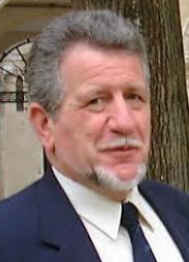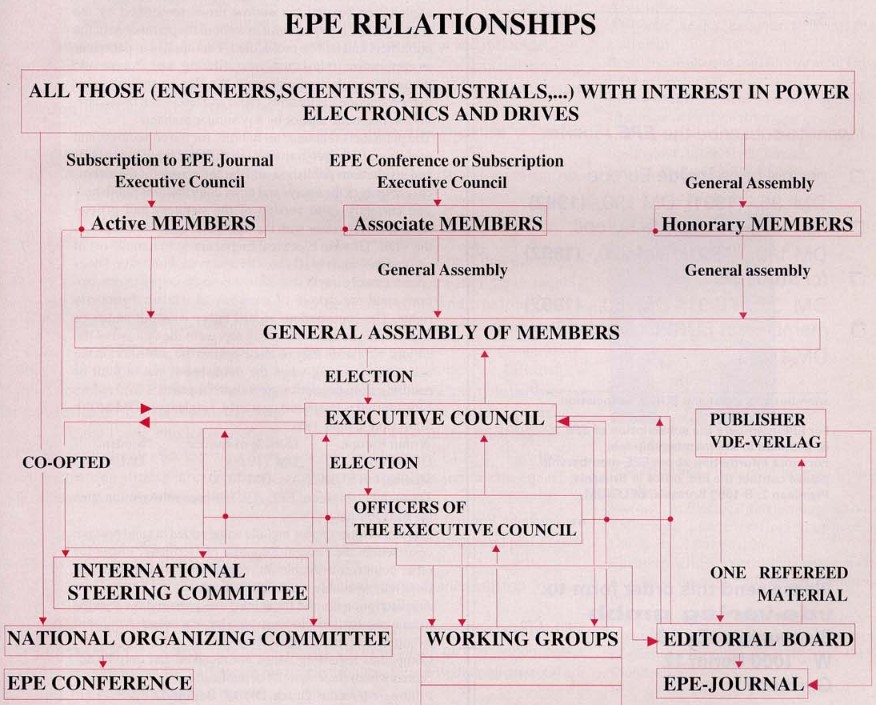The History of EPE Association
History, why, how, what for
At the beginning of the eighties it was strongly felt that too numerous conferences in the field of Power Electronics and Drives were offered leading to choice difficulties, presentation of the “same” papers at different places, etc …
Informal contacts took place in Darmstadt (ETG-GMR conference of 12-14 October 1982), Toulouse (CONUMEL conference of 9-11 May 1983), Lausanne (Control power electronics – variable speed drives conference of 12-14 September 1983) and led to the invitation to a formation meeting at FABRIMETAL in Brussels on 16 November 1983.
The decision made at CONUMEL and strongly supported by its founder, Professor J.C. Sabonnadiere, to integrate it within a European frame has clearly been one of the most important steps towards the coordinated initiative.


The Brussels assembly agreed with following considerations:
Prof. Dr. Ir. Gaston Maggetto
Prof. Dr. Ir. Philippe Lataire
- The European conference on power electronics and drives must not be just another conference which simply adds to the too numerous conferences having, in Europe, the same subject’s matters; it must embody and replace most of the too dispersed efforts.
- European countries supporting the proposal should be willing to restrict their intervening conferences to “national” events.
- The papers will be subjected to a severe refereeing procedure.
- The conference topics should cover fields that are likely to interest most of the manufacturers and the users of power electronics equipments.
- The presence of scientific circles is highly desirable although in harmonious balance with industrial circles.
- The overall responsibility would lie with an International Steering Committee (ISC) as to all decisions concerning the realization of the European conference goals.
- A National Organizing Committee (NOC) chaired by the president of the ISC is to be set up for every conference to take the charge of its organization.
The Conference in Brussels in 1985 was a success (650 participants) and has been followed by two even successful events in Grenoble (800 participants) in 1987 and in Aachen (850 participants) in 1989. EPE’87 in Grenoble (24 September 1987) was the occasion to discuss the advisability of the creation of an Association to give EPE a permanent address and to give it the form of a legal entity. The value of closeness of EEC headquarters from whom support should be sought and with whom European actions in the field of Power Electronics and Drives could be coordinated made Brussels a better choice.
An ISC meeting has been called in Brussels on 27 June 1988 at Fabrimetal to obtain agreement to the prepared Constitution. The recognition of the Association by the Belgian Ministry of Justice is official since 9 January 1989.
The European Power Electronics and Drives Association
The “European Power Electronics and Drives Association”, EPE for short, is subject to Belgian law and administered in accordance with the law of 25 October 1919 granting legal status to international associations with philantropic, religious, artistic or educational aims. The Association shall be non profit making. The object (Constitution – Art. 3) shall be to promote and coordinate the exchange and the publication of technical, scientific and economic information in the Field of Power Electronics and Electrical Drives. EPE doesn’t intend to participate in any commercial endeavours.
The Association is composed of members who are either Active Members or Supporting Members. The Active Members are persons active in the Field. The General Assembly comprises all Active Members. The admission of Active Members to the Association shall be decided by the Executive Council. Supporting Members are the Honorary Members and the Associate Members. Every registrant to an EPE-conference may become automatically an Associate Member for the next two years. The renewal of membership occurs by participation to the next conference or by subscription to the Association. The registered office of the Association is at present in B-1000 Brussels, Tractebel, Simon Bolivarlaan 34-36, Boulevard Simon Bolivar (also registered office of the Societe Royale Belge des Electriciens, SRBE for short) and the secretariat of the Association is hosted by the SRBE, c/o VUB-IrW-ETEC, Pleinlaan 2, B-1050 Brussels.
The creation of the European Power Electronics and Drives Association has changed fundamentally the relationships between the different bodies acting in the frame of EPE. The detailed relationships inside the EPE-organization are summarised on the attached diagram:

The European Conference on Power Electronics and Applications
Presentation of the EPE-conference is probably somewhat superflous because since 1985 it established itself as the largest and most important conference on Power Electronics, Electrical Drives and Industrial Applications runned on a bi-annual base (1985 Brussels, 1987 Grenoble, 1989 Aachen, 1991 Florence). Therefore the EPE-conference intends to be a unique forum of international exchange on the state of the art and future developments in these fields. It aims also to contribute to the attraction of experts from outside Europe and so to a better and vital communication between scientists and industrial experts or engineers of the whole world and with the major scientific organisations in the field.
The Conference provides space for lecture session but mainly for very important dialogue sessions. The dialogue sessions are especially suitable for an intensive discussion with the experts in the field. The time and the space devoted to these sessions are totally free of any other organized activity. After Florence, the EPE planning foresaw a conference in the United Kingdom, more precisely in Brighton in 1993.
The European Journal on Power Electronics and Electrical Drives – EPE Journal
Up to now the bi-annual conference has been the only link between people interested in the EPE activities. Creation of an Association means the creation of a permanent and alive connection between the members. The best way to do this is the publication of a Journal.
The scope of the EPE Journal is to supply all experts in the field of power electronics and drives, especially the EPE members – with the most recent information on the rapid evolution in the field of Power Electronics, Drives and Industrial Applications. This information must be of good level but take into account that it must interest most of the readers. The journal wants to attract contributions from scientists but also and probably mainly the contributions of those who are designing and producing power electronics systems and those involved with the applications of those systems in industrial processes. The role of Power Electronics as a field will be emphasized and every effort will be developed to disembed it from more general names such as Electrical Engineering, Computer science, Automatic Control, etc.. In addition to the author’s contributions, information will be supplied on new products, industrial realizations, firm portraits, EPE Association’s life, contacts with international bodies and in particular with EC, agenda.
EPE: Conference, Association, Journal – Why, What for?
Power electronics is suffering from a not well defined identity. Description of power electronics as a field should be diffused largely to remove the today lack of visibility and stature. This will be the way to attract students, to form more engineers, to influence university and public policy, to acquire R & D fundings from large sources as the EC Framework Programme. It is of the most importance to clarify what power electronics is and how important it is, technically and economically. Power Electronics is connected with:
- Microelectronics;
- Electrical engineering;
- Thermodynamics, because of the problem of evacuation of losses;
- Automatic control;
- Computer science.
Application of power electronics systems needs therefore a multi-disciplinary approach. This is a basic reason to develop a vision that can inspire and motivate the field. The central role of power electronics has to be emphasized. Indeed, in any application, power electronics sits between the source of the energy and the user of the energy, processing that energy as efficiently, as reliably and as cheaply as possible. The impact of power electronics on the industrial process concept is to be highlighted. Endly, for the great public can power electronics be recognized as playing a central role in creating easy homes, smart homes, easy hospital, intelligent muscle,…
This is a way to make young people conscious of the existence of this field.
EPE: Conference, Association, Journal – How?
Europe is still devided into a large number of independant countries and therefore the existence of numerous National Institutions largely independant in their functions but active in the same field is a situation which will not evoluate very rapidly. This evolution could be somewhat accelerated by the official creation of the Open European Market at the end of 1992. In accordance with the philosophy of this event it must be possible to create lateral links between these institutions in different specialised and technical fields giving Europe the opportunity to display a united presence in these fields. The links could take the form of a “European Society on…”. In a similar way, other International Societies are organised. EUREL, the European Convention of National Societies of Electrical Engineers, is an exemple of a first attempt to create a general link between National Institutions.
Taking into account its composition and its trans-European representation, the EPE Association is now proposing to play the role of the European Society on Power Electronics and Electrical Drives restricting its actions to technical and scientific activities and seeking supportive coordination with the national bodies throughout Europe. EPE invites the National Institutions to consider this proposal and to make appointments to discuss this matter further as soon as possible in the spirit of the creation of strong relationship, of avoiding unuseful competition and of confirming the role of Europe in the field.
(From: EPE Journal 1/1991, p. 73)